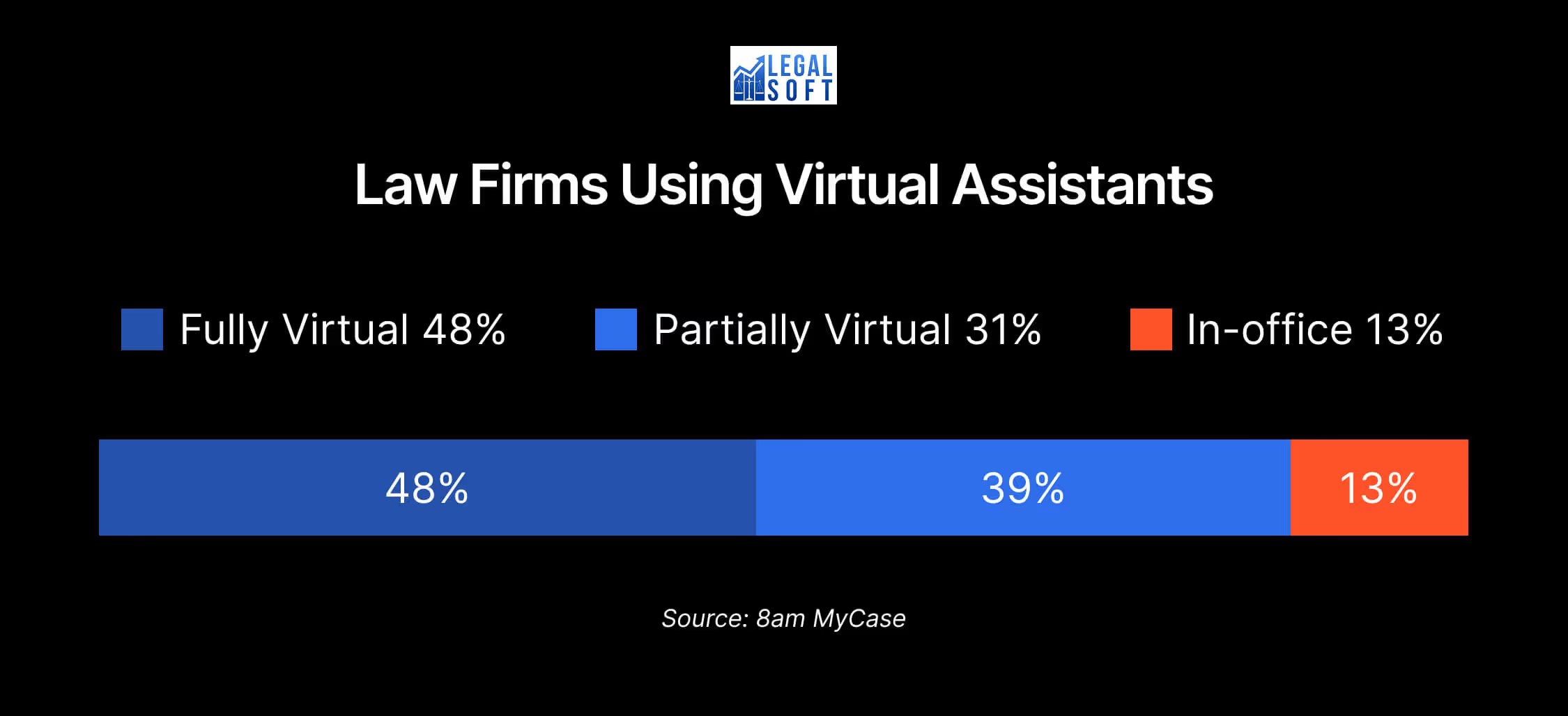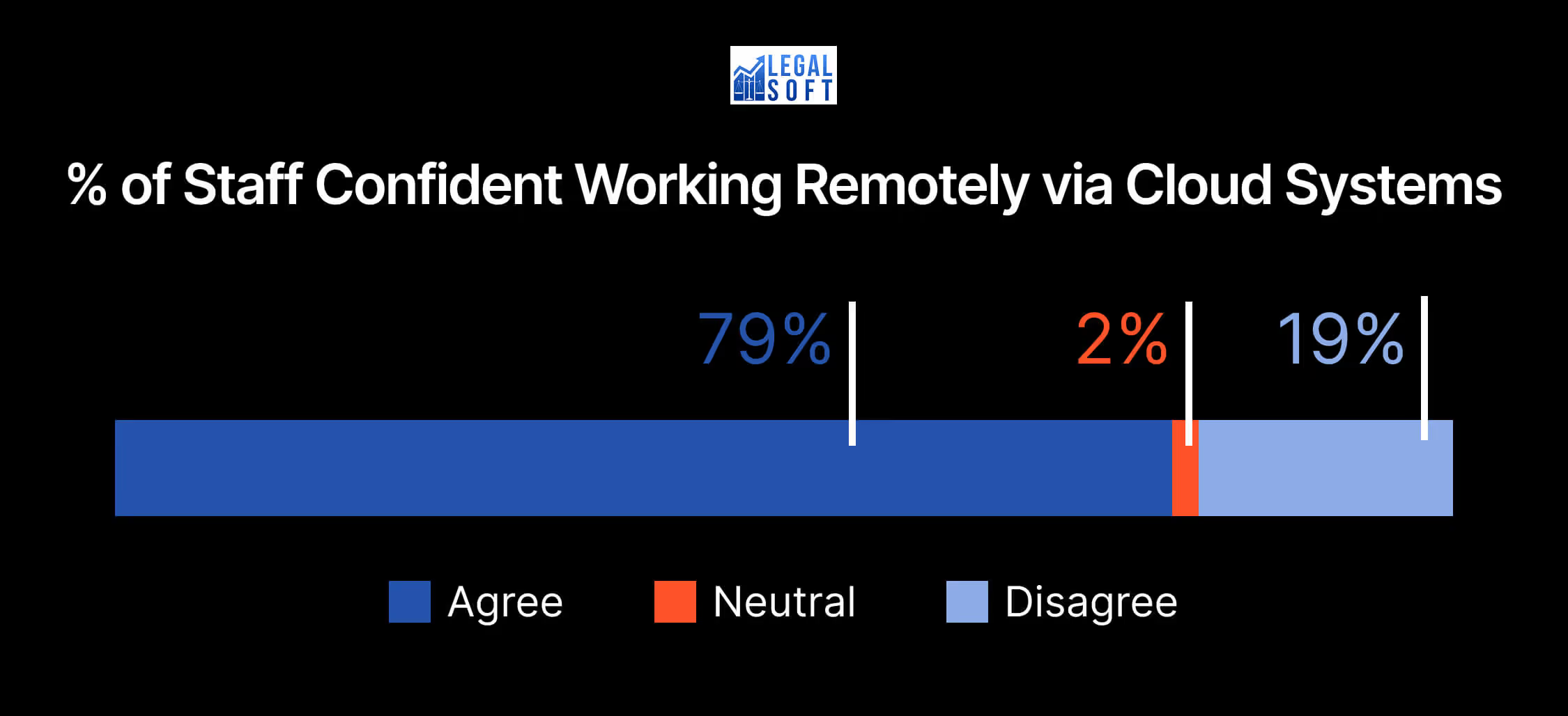A major shift has occurred in how law firms operate since 2020. The COVID-19 pandemic accelerated technological adoption and made remote work widely possible, fundamentally changing what once seemed unchangeable: that legal work must be done in a physical office setting.
This transformation has opened the door to new ways of managing legal workloads, including the rapid growth of virtual assistants in law firms. If you’re exploring how your practice can stay competitive, the data in this post offers a compelling answer.
80% of Law Firms Use Virtual Assistant Services
Recent industry surveys reveal widespread adoption. An estimated 80% of law firms are currently using virtual assistant services in their practices. This includes virtual legal assistants, paralegals, and administrative support staff working remotely.
This high adoption rate stems from the cost-effectiveness of virtual legal assistance that many law offices discovered. Virtual professionals can be hired on a flexible contract, hourly, or project basis, eliminating many of the expenses associated with full-time employees, equipment, and expanded office space.

What Virtual Legal Assistants Actually Do
The foundation of remote legal work lies in the powerful technological tools and secure platforms that enable high-level, confidential tasks to be handled from anywhere. Modern law firm software and cloud-based systems make the virtual model possible for nearly every task an in-office assistant can perform. Firms are no longer limited by geography when building their support teams.
Here's what virtual legal assistants typically handle for law firms:
- Client communication and intake – One of the most common services handled remotely is client intake. Virtual assistants manage client calls and emails, conduct initial consultations, gather case information, and create a personalized intake process with the right guidelines.
- Document preparation and management – Virtual assistants draft pleadings, motions, contracts, and correspondence, while maintaining document management systems to ensure all files are properly stored and accessible.
- Calendar and deadline management – They track court deadlines, schedule hearings and depositions, manage calendars, and send timely reminders.
- Legal research and case support – They conduct legal research, prepare case summaries, organize exhibits, and assist in developing stronger arguments by gathering relevant precedents and statutory information.
- Billing and administrative tasks – Virtual assistants can handle timekeeping, invoice preparation, payment processing, and the administrative tasks that support daily operations.
- Discovery assistance – They organize discovery documents, prepare privilege logs, compile document productions, and help manage the extensive documentation often involved in litigation.
- Trial preparation support – Virtual assistants compile witness lists, organize exhibits, prepare trial binders, and coordinate the logistics that make trial preparation less overwhelming.
Remote Work Confidence in Legal Sector
A question on many legal professionals' minds: is virtual legal assistance just a temporary trend? The answer lies in the confidence staff have in their ability to perform their duties remotely.
A study of law firm staff using cloud-based systems found that 79% of staff feel they have the necessary resources to complete their work from home effectively.
This pattern shows that remote work options have moved from emergency measures to preferred options for many professionals. The confidence professionals feel in completing tasks with technology tools has changed expectations about where legal work can take place.

Many industry experts now predict that remote work options have become the new norm that firms across all practice areas are offering, and the trend is here to stay. Firms are not adopting a short-term trend, they are embracing a lasting transformation in the legal profession.
Why the Increase? Industry Forces Driving Adoption
Several powerful forces are driving law firms to adopt virtual assistance at an accelerating pace:
Staffing shortages
According to the CLM Law Firm Survey, 60% of law firms are turning down work due to capacity issues, and recruiting new attorneys is one of the major challenges for law firms today. Virtual staffing helps address these constraints by expanding the pool of qualified candidates you can hire exponentially beyond the local market.
Shift to Hybrid/Remote Models
Firms are moving from traditional in-office setups to hybrid or fully remote models to attract top-tier talent. Extending this model to support staff became a logical next step that opened access to talent anywhere in the world.
Competitive Pressure
Data in this guide shows that firms relying solely on traditional setups risk falling behind competitors who use virtual assistants to reduce costs and increase efficiency. Modernizing through virtual support has become a key strategy to stay competitive.
Legal Software Advancements
The continuous development of legal technology and rise of AI-powered tools have eliminated the technical barriers that once made remote work impractical. Firms now have access to secure case management systems, cloud-based document storage, encrypted communication platforms, and practice management tools that make location irrelevant.
Client Expectations
Demand for faster turnaround on legal services continues to grow. When you can delegate work to a virtual assistant, you can dedicate more time to billable work and case strategy. Additionally, leveraging assistants in different time zones can extend your firm’s working hours and deliver results around the clock more quickly.
Pros and Cons of Legal Virtual Assistance
While the move to virtual legal assistance can be beneficial for most firms, it’s important to weigh both the advantages and challenges before integrating it into your practice.
The Pros
- Scalability: Quickly scale your support team up during busy periods or down based on your current caseload, without the complexity of hiring or laying off full-time employees.
- Increased productivity: Delegating routine and time-consuming administrative work allows attorneys to focus on core legal tasks and billable work.
- Business continuity: With virtual assistants distributed across locations, your practice is protected from local disruptions such as weather events or office emergencies.
- Cost savings: Reduce or eliminate expenses for office space, equipment, and employee benefits while accessing the same quality of legal support you expect from in-house staff but at lower rates.
- Access to specialized expertise: You are no longer restricted by location, allowing you to hire VAs with specific skills and specializations for particular projects.
The Cons
- Training and onboarding: You'll need to develop systems for training remote workers on your processes and your workflow so they can start without any disruption into your operations.
- Communication concerns: You can't just walk down the hall to clarify something, so you'll need to establish clear communication protocols to prevent delays or misunderstandings.
- Security and confidentiality concerns: Ensure virtual assistants and their tools operate under secure systems and are fully compliant with all legal confidentiality and data security requirements.
A virtual assistant provider that addresses these challenges while maintaining the benefits can be a significant advantage for law practices. One example is Legal Soft, which connects law firms with virtual assistants who are trained, compliant, and fully aware of their ethical obligations under attorney-client privilege.
How Law Firms Are Adapting
The legal profession’s shift to virtual work has happened with remarkable speed. When the pandemic forced sudden changes, law firms proved they could be far more agile than many expected.
Some legal professionals remain concerned about the resources required to implement virtual work and the potential for operational delays. However, industry surveys reveal that 75% of law firms were able to transition to remote work in less than a week. This rapid adoption has caught the attention of many firms considering the switch.
Smart firms are not treating remote work as a temporary adjustment. For small law firms, which are often understaffed and face challenges competing with larger firms, virtual work has become a practical solution. Many successful practices used this period to refine their remote workflows, invest in better technology, and develop systems to manage virtual teams effectively.
Is Virtual Legal Assistance Right for Your Firm?
The data clearly shows that virtual legal assistance has moved from feasibility to reality for most law firms. With more than half of practices already using virtual support and confidence in remote work remaining high, it is no longer a risk but is increasingly becoming the standard in the legal industry.
Whether you’re a solo practitioner or run a small to mid-sized firm, embracing virtual legal assistants can be one of the fastest and most cost-effective ways to manage your workload and scale your capacity. You can maintain a smaller physical office, access talent from anywhere, and build a practice that isn’t limited by local hiring markets or geographic constraints.
Virtual legal assistance isn't just about cutting costs—it's about building a more resilient and competitive practice that can adapt to whatever changes the future brings.

References
- American Bar Association (2024). The Landscape of Remote Paralegals and Legal Assistants.
- 8amMyCase (2025). How Law Firms Are Responding to COVID-19 – Remote Work.
- Claims and Litigation Management (2025). Overwhelmed and Understaffed.








